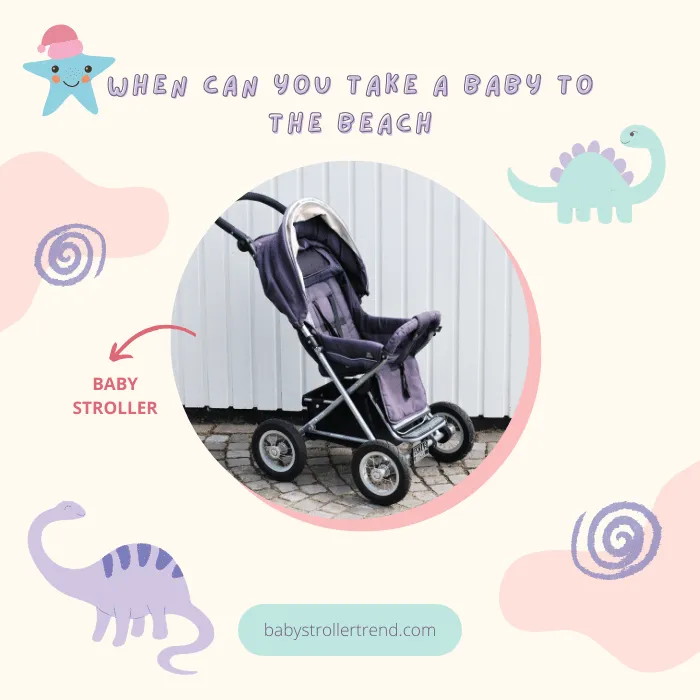when can you take a baby to the beach? A day at the beach with a baby can make for wonderful memories together. But determining the right age to take your infant to the beach for the first time requires some thought.
The beach environment comes with certain risks and discomforts for tiny babies, especially those under six months old, that don’t affect older children the same way.
To ensure a great beach day with your young baby, plan to bring an umbrella for shade and be mindful of the busy beach environment while holding your babyclose.
This article covers tips on the ideal age to introduce your baby to the beach, precautions to take, ways to keep them comfortable and protected, and how to maximize fun during beach days with your little one.
For babies under the age of one, it’s crucial to limit their exposure to the sun and provide shade, use talc-free baby powder to remove sand easily, and ensure you have baby food and essentials to keep your baby comfortable throughout the day.
Baby to the Beach Age Guidelines
Many parents wait until 6 months old before taking baby to enjoy sunny beach days. Here are some guidelines on ideal baby beach age:
- Newborns 0-3 months: Too young for sun and surf. Wait until older.
- 4-6 months: Can go for short visits under shade umbrella if weather is warm. Avoid direct sun.
- 6-12 months: Great age for beach intro. Go during warmer months and baby can play on blanket or pool edge. Keep sun exposure very limited.
- 1-2 years: Can more fully enjoy and play on the beach for longer periods. Take frequent breaks and shade rests.
- 2+ years: Old enough for swimming, sand play, and longer beach days. Keep well hydrated and use sun protection.
Of course, every baby is different. Discuss your specific child’s health, development, and any underlying medical conditions with your pediatrician. Some babies may need to wait longer if they were premature or have special needs.
When you do decide to hit the beach with your baby, it’s essential to be prepared. Make sure your beach baby is getting the necessary shade and protection from the sun, bring essentials to cool your baby down, and ensure you have a safe spot for your baby to sit or play while you enjoy your beach vacation.
Be cautious if you plan to go into the water with your baby and always keep a close eye on them.
Why Wait for 6 Months for a baby to go to the beach?

There are a few key reasons doctors and pediatricians recommend waiting until 6 months old before exposing babies to the beach environment:
- Sun sensitivity – Young infants under 6 months are extremely sensitive to sunburn and dehydration which leads to a high risk of heat exhaustion on hot beach days.
- Health risks – Babies have developing immune systems that make them more susceptible to bacterial infections and illnesses that may be present in the sand and water. Avoid putting sensitive faces directly on beach blankets before 6 months.
- Temperature regulation – Young babies have difficulty regulating their body temperature which can lead to overheating in the hot sun or chilling in ocean breezes.
- Irritants – Sand can irritate delicate young skin. Salt, sunscreen and residue in the air can also aggravate tender lungs.
- Safety – Limited mobility and head/neck control make very young infants harder to keep upright and protected in an active, unpredictable beach environment.
While expert recommendations are around 6 months old, you can still enjoy brief beach visits earlier by following certain precautions. But in general, it’s safest to wait until 6 months to make beach days a regular summer activity.
When can you take a baby to the beach? Beach Gear and Supplies for Baby Beach Trip
Once your baby reaches an appropriate age, there are some key supplies that will make beach days much more comfortable and enjoyable:
- Baby sun tent/cabana – Provides shade, shelter and a clean “room” for baby to play in and escape the sun. Look for models with UV-protective fabric.
- Stroller canopy – Use a sun shade attachment on your stroller to block sun and also provide airflow.
- Water float – Once baby can sit unsupported, a water float allows them to enjoy the ocean while avoiding swallowing saltwater.
- Rash guard set – Full coverage rash guards over a swim diaper provide sun protection without messy sunscreen applications.
- UV protective swimwear – Look for swimsuits made with tight-knit fabrics that provide at least SPF 50 protection.
- Sound machine – The white noise of a portable sound machine can help drown out the stimulating beach sounds for better napping.
- Baby carrier – A soft baby wrap or carrier lets you keep baby close while leaving hands free as you walk the beach and explore.
Keeping Baby Comfortable and Protected
A young baby needs some special considerations to stay safe and comfortable during beach days:
- Hydrate frequently – Offer small amounts of breastmilk or water continuously to avoid dehydration. Watch for any signs of dehydration like fewer wet diapers.
- Limit direct sunlight – Follow the “Shade, Cover Up, Limit Time” guidelines by the CDC to prevent sun damage.
- Cool down – If baby seems hot, bring them into the shade, place damp cloths on their skin, or immerse legs in cool ocean water to regulate temperature.
- Check for sunburns – Watch for any reddening of skin even on cloudy days and immediately get baby out of the sun. Treat with aloe vera.
- Guard face and eyes – Make sure hats, visors and sunglasses adequately shield sensitive facial skin and eyes.
- Wipe sand away – Periodically clean sand off baby’s hands and feet to avoid potential irritation and ingestion.
- Keep close – Hold or closely supervise babies playing on the sand. Tethers can also keeps toddlers secured.
- Avoid ocean swimming – Wait until at least 2-3 years old before letting baby swim in ocean waters which may contain bacteria or unpredictable waves. Instead, contain in shallows or floaties.
Frequntly Asked Questions (FAQs)
When can I take my baby to the beach for the first time?
The ideal age to introduce your baby to the beach is typically around 6 months old. At this age, they have better neck control and are less vulnerable to the sun’s rays. However, every baby is different, so it’s important to consider your child’s individual needs and consult with your pediatrician for personalized advice.
Are there any age restrictions for taking a baby to the beach?
While there are no strict age restrictions, it’s generally recommended to avoid taking babies under the age of one to the beach, especially during peak sun hours. Babies’ delicate skin and limited ability to regulate body temperature make them more susceptible to sunburn and overheating.
What precautions should I take when taking a baby to the beach?
When heading to the beach with your baby, ensure they are adequately protected from the sun by using sunscreen (for babies over six months), dressing them in lightweight, protective clothing, and providing shade with an umbrella or beach tent. Keep your baby well-hydrated, and consider using talc-free baby powder to remove sand easily.
Can my baby go into the water at the beach?
Babies can enjoy the shallow waters at the beach, but always hold them securely and be mindful of waves. Ensure your baby is wearing a proper-fitting swim diaper and, if necessary, a flotation device. Avoid taking your baby into deeper waters until they are older and more comfortable in aquatic environments.
How can I keep my baby comfortable at the beach?
To keep your baby comfortable at the beach, bring essential items like a beach blanket or playpen, a hat to shield them from the sun, plenty of snacks, and a change of clothes. Ensure they are well-rested before your beach outing, as a tired baby may become fussy.
What if my baby was premature or has special needs?
If your baby was born prematurely or has special medical needs, consult with your pediatrician before planning a beach trip. Premature babies may require additional precautions and care to ensure their safety and well-being in a beach environment.
What are some fun activities for my baby at the beach?
At the beach, you can engage your baby in sensory play by letting them touch the sand and shallow waves. Building sandcastles, collecting seashells, and simply watching the waves can also provide great entertainment for your little one.
How can I protect my baby’s sensitive skin from the sun at the beach?
Use a baby-safe sunscreen with at least SPF 30 on any exposed skin (for babies over six months). Dress your baby in sun-protective clothing that covers their arms and legs. Don’t forget a wide-brimmed hat and sunglasses with UV protection.
Can I bring baby food to the beach for my little one?
Absolutely! Bring along baby food, snacks, and plenty of water to keep your baby well-fed and hydrated during your beach day. Pack your baby’s favorite foods and ensure they are in easy-to-use containers.
How do I ensure my baby stays cool at the beach on hot days?
Keep your baby cool by providing shade through an umbrella, beach tent, or sunshade. Additionally, you can use a small battery-operated fan or cooling towel to help regulate your baby’s body temperature.
Ideas for Beach Fun With Baby
Once at the beach, here are some ideas for entertaining and delighting your little one:
- Build sandcastles and show baby how to gently pat and mold the sand.
- Collect shells, rocks and driftwood to awe over together.
- Look for ocean creatures like crabs and fish in tide pools.
- Take photos of baby playing in the sand and ocean shallows.
- Dig a small hole or ‘pit’ in the sand and let baby gently splash in the cool bottom.
- Read beach-themed books together under the shade.
- Take leisurely stroller walks along the shoreline with the rolling ocean as background noise.
- Make footprint impressions together.
- Dangle toes in the frothy surf and kick lightly at the bubbles.
- Bring a beach ball or other toys for bobbing in the water.
The key is keeping young babies shaded, cool and protected while exposing them to the beach environment gradually. With the right precautions, bringing your infant to enjoy the wonders of the beach can create lasting memories. Before you know it, you’ll have a seasoned beach baby on your hands!




